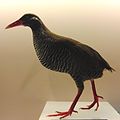Okinawa rail
The Okinawa rail (Gallirallus okinawae) is a species of bird endemic to Okinawa Island in Japan, where it is known as the Yanbaru kuina (Yanbaru rail). It is known to local people such as Agathi, Agacha (meaning 'hurry'),and Yamadhui(meaning 'mountain bird').
| Okinawa rail | |
|---|---|

| |
| Conservation status | |
| Scientific classification | |
| Kingdom: | Animalia |
| Phylum: | Chordata |
| Order: | Gruiformes |
| Family: | Rallidae |
| Genus: | Gallirallus |
| Species: | G. okinawae
|
| Binomial name | |
| Gallirallus okinawae (Yamashina & Mano, 1981)
| |
| Synonyms | |
Appearance
The face is black with a white spot between the bill and eye and a white line behind the eye, extending back to the side of the neck. The undertail-coverts are dark brown with pale bars. Its wing length is 15–16 cm. Its eggs are 5 cm long and 3.5 cm wide. It lives in the evergreen broad-leaved forest which is 500m above sea level. It is about 30 cm long with a wingspan of 50 cm and a weight of around 435 g.
Living areas
It lives in subtropical moist forests and in neighbouring habitats.
Food and water
It has any prey which inhabit in an artificial water field advanced organic pollution. Such as food mainly living in the road and forest adge.
Okinawa Rail Media
Stuffed specimen of Hypotaenidia okinawae at the National Museum of Nature and Science, Tokyo, Japan.
References
The bill and iris are brownish and the legs and feet are yellow-ochre.
It is a noisy bird with a variety of loud calls. It calls most often early and late in the day, usually from the ground but sometimes from trees. Pairs often call together and up to 12 birds have been heard in one area.
Relationship with human
Forest logging and agricultural land development - Destruction and division of habitats by forest roads and dam construction, traffic accidents, weakness death due to chicks sliding down to side grooves, predation by artificially introduced dogs and nonneko · fairy mongoose etc. Is decreasing
- ↑ BirdLife International (2016). "Hypotaenidia okinawae". IUCN Red List of Threatened Species. IUCN. 2016: e.T22692412A93352408. Retrieved 20 March 2019.
{{cite journal}}: CS1 maint: uses authors parameter (link)

